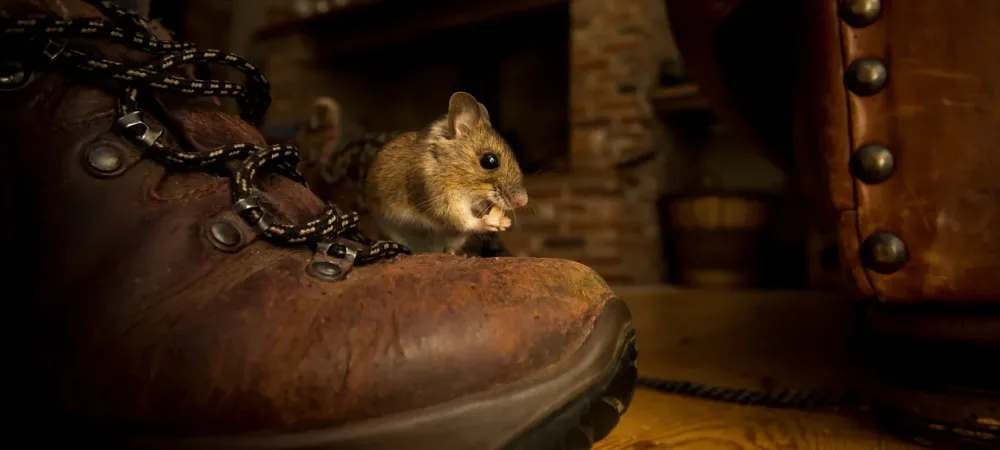Rodents in Oklahoma: Everything You Need To Know

Though there are several species of rodents found living here in Oklahoma, there are only two that present themselves as major pests: rats and mice. Other rodents such as squirrels will occasionally take shelter under porches or inside attic spaces, but usually only do so during the colder months or when the weather outside becomes unfavorable.
What are Rodents?
Rodents can be characterized by their sharp, front incisors that never stop growing. To maintain their teeth and keep them at a manageable length, rodents will chew and gnaw on just about anything they can find. And if these rodents find their way into your home or business, that behavior can cause some serious and often costly problems.
Are Rodents Dangerous?
The answer to this question is yes, both mice and rats are considered dangerous pests. The dangers that these rodents pose come in two forms: dangers to your health and dangers to your home. Like we mentioned before, rodents have a constant need to chew and, due to the strength of their teeth, the list of things they can chew through is rather long. In fact, their teeth are so strong they can chew through wire mesh, concrete, and even lead. This could mean trouble for the inner workings of your home or business! The biggest threat that mice and rats pose when living inside the walls of your home is to your wiring. If rodents come across a clump of wiring between them and where they want to go, they will likely attempt to chew through it, making them even more unwelcome in your home! In addition, if those wires are live, they could spark a fire in your home.
Another threat rodents pose is the spread of diseases and parasites like fleas and ticks. Some of the diseases that mice and rats carry include:
- Salmonellosis
- Lymphocytic choriomeningitis
- Mycoplasma
- Leptospirosis
- Dysentery
The parasites that mice and rats carry can also spread harmful diseases. Fleas are known carriers of murine typhus and the plague and are capable of spreading tapeworm to both humans and our pets while ticks are known to transmit diseases like Lyme disease, Powassan virus, Rocky Mountain spotted fever, and babesiosis.
Why Do I Have a Rodent Problem?
Rodents will invade homes to gain access to their three basic needs: food, water, and shelter. If your home provides an ample amount of these necessities and rodents can get inside through a breach in your home or business’s exterior, they’re likely to stick around. And these rodents only need a very small opening to be able to squeeze inside.
How Do I Get Rid of Rodents?
If you find rodents inside your home or business, your first move should be to call the professionals here at Dandi Guaranty to remove them. Our pest technicians have been trained to handle rodents of all shapes and sizes, including mice and rats, and are equipped with the highest quality tools to meet the specific needs of your home or business. Don’t let rodents threaten your home or business! Instead, partner with Dandi Guaranty and keep those rodents out!'
Can I Control Rodents Myself?
Eliminating rodents using DIY rodent control methods can often feel impossible. Oftentimes, rodent traps don’t work correctly and pesticides can be harmful to more than just the rodents they’re meant to eliminate. And no matter how much success you think you’ve seen, more rodents keep showing up. If you’re dealing with a rodent problem in your home or business, don’t drive yourself crazy trying to handle it on your own. Instead, partner with the Oklahoma pest control experts here at Dandi Guaranty for quality rodent protection! With our comprehensive residential and commercial pest control services and specialized rodent control products, we’ll get rid of those rodents in no time!
What Are Roof Rats?
Named for their preference of hanging out in trees and the upper levels of structures they have invaded, roof rats are a common invader of homes and businesses. Roof rats have a thin body covered in smooth dark brown or black fur with gray hairs scattered throughout. The fur on their underbelly is a lighter color than the fur covering the rest of their body. From pointed nose to tail roof rats grow to between 12-16 inches in length. They have large ears and a scaly tail that is longer than their body.
Are Roof Rats Dangerous?
Like all other species of rodents, roof rats, have front incisors on their top and bottom jaw that grow continuously throughout their life. To keep their teeth sharp and from overgrowing they gnaw on objects they come across. Their constant chewing allows roof rats to cause a lot of damage inside of homes and other structures.
Roof rats will gnaw through walls, wiring, pipes, cables, and other structural elements. They will also eat and contaminate stored food. They spread diseases and make people ill with things like salmonellosis and rat-bite fever. The fleas and ticks that are living on the backs of roof rats also spread diseases to people.
Why Do I Have A Roof Rat Problem?
Roof rats are a type of rodent and are known for being very athletic and agile. They can easily climb trees and utility poles to gain access to structures through the roof. They may also choose to live under plants or buildings, and in sewers. Inside of homes and other buildings, roof rats nest in attics, basements, crawl spaces, and behind walls voids. Like most species of pests, roof rats are most attracted to properties that offer them multiple areas to forage for food- trash cans, compost piles, gardens, fruit trees, and pet food bowls for example.
How Do I Get Rid Of Roof Rats?
If you’re looking for a way to eliminate roof rats from your property for good, call Dandi Guaranty! With that one call, we will send our pest technicians to inspect your home for signs of rat activity. They will not only determine the problem areas and eliminate current infestations, but will also treat your property to prevent any future invasion. To learn more about how our Quarterly Pest Control Plan can help solve your roof rat problem, visit our residential rodent control page today!
Can I Eliminate Roof Rats Myself?
Once roof rats have chosen your home or property to live or forage for food in, the best solution is to partner with Dandi Guaranty. To help prevent problems with roof rats it is best to eliminate sources of food, water, and potential shelter from your property. Keep tight-fitting lids on trash cans, recycling bins, and compost bins. Pick-up uneaten pet food. Stop roof rats from finding their way into your home by sealing any cracks in the foundation, exterior walls, and roofline of your home; place tight-fitting caps on chimneys. Cut tree branches back from the exterior of your home. Place metal flashing at the bottom of fruit trees on your property to stop roof rats from climbing them.
